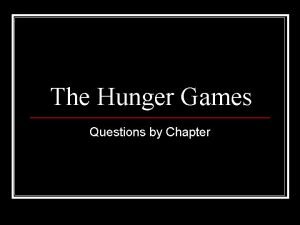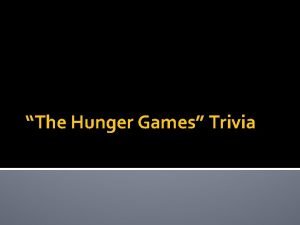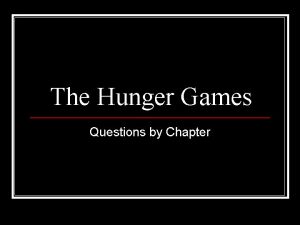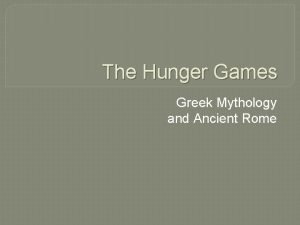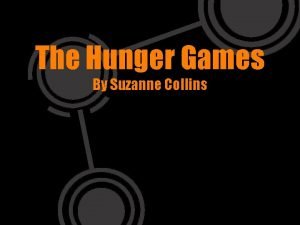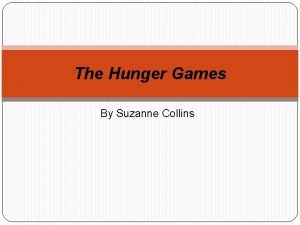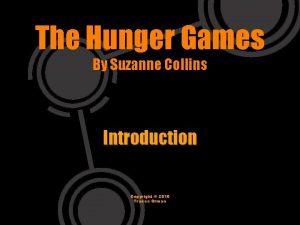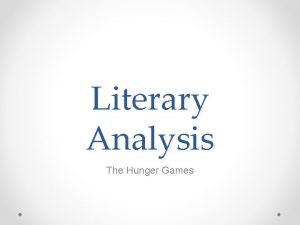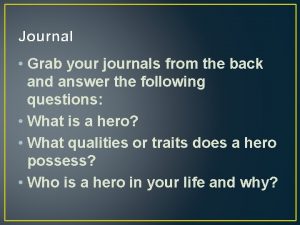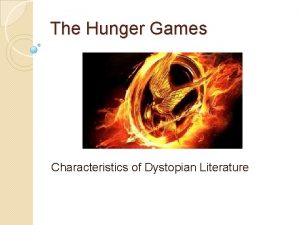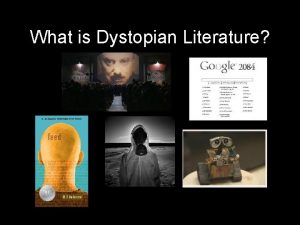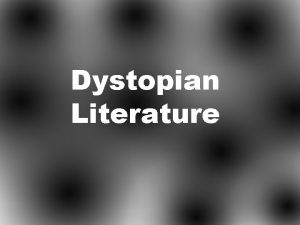The Hunger Games Characteristics of Dystopian Literature Dystopian











- Slides: 11

The Hunger Games Characteristics of Dystopian Literature

Dystopian Setting � Usually set in a bleak (hopeless) world where, against all odds, a portion of the population survives some sort of global disaster or war. � Many dystopias center around a political event like revolutions, or a citizen uprisings. � Man-made disasters like overpopulation, geneticengineering, environmental destruction, global warming, etc. are often the source of the original problem.

Dystopian Government � The aftermath of the disaster results in a shift of power and control, to a government run by a totalitarian dictator. � These governments (usually run by a rich elite) control all aspects of life and try brainwash the population. � Citizens lose access to all knowledge and information and freedom of speech is severely restricted. � The majority of people are cut-off and isolated from the ruling elite and spend most of their day struggling to provide food and shelter for their families. � Everyone must obey the government or face severe penalties. � People are encouraged to spy on each other and report back to the government.

Life is highly controlled � The majority of the population is oppressed and frightened. � The average citizens are systematically dehumanized (lose their self-esteem) because of poverty, hunger, torture, etc. � Religion no longer exists—the government is the new religion. � People have little memory of the past and accept what they are told by the government. � Citizens are expected to believe what they see on government controlled media. � No one is allowed to enjoy any form of entertainment art, music, reading, sports, etc.

Revolution is often the solution � The poor living conditions and lifestyle, the lack of privacy, and the harsh treatment is creating resentment and anger. � Growing numbers of people feel frustrated and unhappy with their lives. � The people gradually begin to feel that the only way to improve their lives is to overthrow their government.

Dystopian Hero/Heroine � The hero/heroine is usually the main character who questions the rules of society. � They feel that something is terribly wrong with the way they are treated by those in power. � The hero/heroine comes to believe that escaping or even overturning the social order is possible. � They decide to act and risk their own lives to change things. � Sometimes the hero/heroine manages to escape or start an uprising. But, ultimately fail to change anything. � Sometimes they themselves give in and end up conforming to the society's rules.

Dystopia: Unresolved Endings � Even if the hero/heroine succeeds in causing the overthrow of society, it is usually unclear as to final result of the revolution. � A new challenge emerges because a new society has yet to be established as a replacement to old one. � Dystopias have unresolved endings and the reader/audience is left to come to his/her own conclusions.

Dystopias: Common Themes Typical themes include warnings about: � too much government control over the lives of citizens � blind faith in government and technology as solutions to problems � laws restricting freedom of information and freedom of speech � government control over media invasion of personal privacy—viewing personal records without court orders.

Dystopias: Common Concerns � Environmental issues (climate change, pollution, etc. ) � World poverty (unequal distribution of wealth) � The increasing gap between the rich and the poor � Mass media: hype and entertainment over substance and truth � loss of values, ethics, morality in society

Dystopia: Author’s Purpose � The author’s intention is to criticize frightening and troubling social trends in our society. � Dystopias are designed to warn the reader/audience about what the future could be like if society continues on its present course. � The bleak conclusions and unresolved endings of dystopian fiction are aimed at getting the audience to work to change current attitude of government and society. � The goal is help future generations avoid facing the horrors experienced by the characters in the novel.

Popular Dystopian Literature
 What happens in chapter 22 of the hunger games
What happens in chapter 22 of the hunger games Communicuffs
Communicuffs The hunger games setting
The hunger games setting The hunger games questions
The hunger games questions Hunger games roman
Hunger games roman What is district 4 in the hunger games
What is district 4 in the hunger games Tesserae hunger games
Tesserae hunger games Hunger games copyright
Hunger games copyright Hunger games book author
Hunger games book author Do you think katniss' anger towards her mother is justified
Do you think katniss' anger towards her mother is justified Theme of the hunger games with quotes
Theme of the hunger games with quotes The hunger games a hero's journey begins
The hunger games a hero's journey begins
